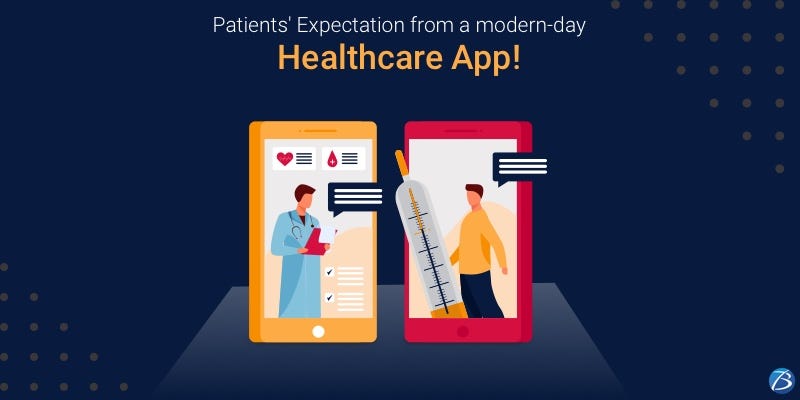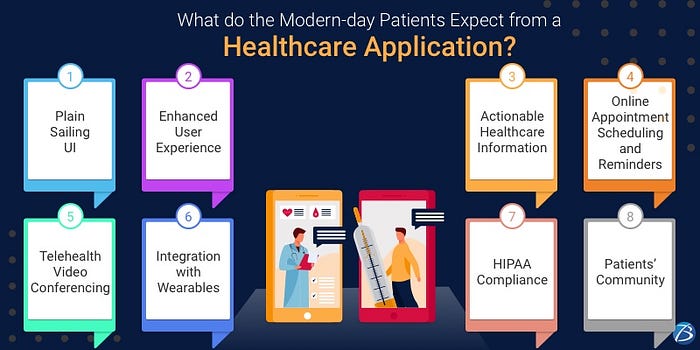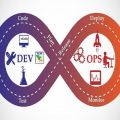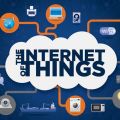What do the Modern-day Patients Expect from a Healthcare Application?


The trend of delivering healthcare solutions via a Mobile Healthcare App is garnering popularity and recognition at a fast pace! Medical facilities, as well as providers, are heavily investing in healthcare app solutions to enhance the service quality and encourage the approach of patients’ self-management. These solutions usher in immense benefits like timely medical aid regardless of the patients’ location, reduced errors concerning diagnoses and treatment, improved doctor-patient communication, lesser medical expenses, and many more.
Yet, it has been observed that the adoption rate of healthcare apps is lower than expected despite the availability of endless options. The reason is simple. Most apps fail to satisfy the expectations of the end-users. So, before you proceed to hire a Healthcare App Development Company for crafting that perfect app for you, you must be aware of what features your target customers are looking for. Now, the million-dollar question is, “What do patients expect from a healthcare app?” Well, my write-up answers it all.
This blog throws light on the consumer expectations from a healthcare app and also provides guidance on the essential features to include in a patient-centric healthcare app.
What do Patients expect from a Mobile App?
Patients using a healthcare application generally prefer the following features:
- Effortless scheduling/canceling/postponing of a doctor appointment
- The facility of obtaining ePrescriptions including the dose recommendation and being able to access health records easily
- The availability of the directory containing all health records at a single place
- Online screening of minor symptoms that do not require a physical visit to the doctor
- Regular aid concerning healing and early rehabilitation of patients
Key Features to include in a Patient-centric App

Plain Sailing UI
Patients using healthcare applications belong to various demographics and so we cannot expect every one of them to be tech-savvy. For this reason, your app must involve an easy login procedure, preferably through a single ID card or a Google account. Its functioning should be such that the users receive the maximum output of healthcare information by providing minimum or precise inputs. An audio-based patient compliant portal will be a perfect example in this case.
If the first page of your app asks for too many details, the users are reluctant to survey further. Therefore, it is important to devise progressive reduction methodologies for integrating information and sections so that the patients’ contribution gets reduced.
Moreover, your app must stimulate self-explanatory navigation for switching between various interfaces. Hence, it is a good idea to implement virtual assistants or audio-based instructions in multiple languages, for guiding users as they sail through your app.
Furthermore, all aspects of your app should be visually likable and instantly available. Remember that the patients’ grasp on your app is dependant on factors like fonts, colors, theme, loading speed, and response time of the application.
Simple but Amazing User Experience
Most apps fail to impress end-users owing to below-average user experience. As such, it is important to deliver an amazing digital experience by providing a user-friendly UI and eye-catching data visualization based on the target audience. For instance, if your target audience happens to be elderly individuals, it is advisable to opt for larger-sized app icons and texts.
Actionable Healthcare Information
Patients are going to stick to your app, only if it offers detailed, valuable, and actionable medical information. This is because patients prefer obtaining detailed information about their medical condition, and its causes; so that they can take necessary action based on the opportunities available. Hence, your healthcare app solution should provide all-inclusive and actionable details on a particular medical condition.
Online Appointment Scheduling and Reminders
The online appointment scheduling facility comes with the following advantages for patients.
- The convenience of booking appointments online and the flexibility to alter the appointment schedule or cancel the same
- Round-the-clock availability, ease of booking appointments, and also a great time saver.
- Better error handling by hospital staff and efficient management of appointments
Besides appointment scheduling; modern-day customers, specifically those with chronic conditions, prefer receiving reminders concerning appointments, medicine timing, prescription renewals, follow-up schedule, and checking of vitals like blood pressure, heart rate, etc. Such reminders are provided via text message notifications and even phone calls. This strategy works wonders in retaining customers as well as attracting new ones.
Telehealth Video Conferencing
Telehealth Video Conferencing has elevated doctor-patient communication to a new level altogether. It provides an effective platform where the patients can connect to their practitioners and avail of online consultations instead of physically paying a visit to the medical facility. Check out its distinct benefits for patients.
- saves patients’ time as well as expenses
- allows patients to easily co-ordinate with specialists
- ensures the continuity of care
- provides remote care for patients residing in remote places
- enables medical providers to stay informed about the patients’ condition and remotely monitor their medical data
Integration with Wearables
Wearable devices like smartwatches, fitness bands, and health trackers are quite popular amongst the masses. So, if your healthcare app has the ability to integrate with wearables, it would be widely adopted. Wearable devices collect crucial medical data like blood sugar levels, heart rate, tremors, sleep patterns, posture control, workouts, etc. enabling patients to know more about their fitness regime and manage their medical conditions in a better way.
HIPAA Compliance
Most patients these days look for HIPAA compliant healthcare apps to make sure that their healthcare data is protected and the personal information shared by them is not compromised. Patients are critical about the medical data shared as this data is used for insurance coverage as well. HIPAA (The Health Insurance Portability and Accountability Act) mandates that any app accessing PHI (Personal Healthcare Information) must adhere to HIPAA regulations and security standards. A HIPAA compliant app ensures that sensitive personal information and patients’ data are protected.
Patients’ Community
Adding the feature of a patients’ community will add value to your healthcare application as patients wish to connect and interact with each other. For example, a patient who has been diagnosed with a specific health condition or disease would want to contact individuals suffering from a similar condition. This strategy allows patients to garner the much-needed comfort level and peer support, and is an excellent way to engage end-users.
Roadmap: Generation of Actionable Insights from your Target Audience
It is advisable for app providers to build an MVP first instead of a full-fledged application as this is the best budget-friendly way to know what your target audience expects from the healthcare app. An MVP is the most basic and generic version of the envisioned app, with all the primary features and functionalities. In the case of a mHealth app, an MVP plays a vital role in generating actionable insights from the beta testers and early adopters. Once, you identify the areas of improvement through user feedback, promptly resolve the shortcomings and implement the necessary add-ons by launching updated versions. This will make your healthcare mobile app all the more convenient and accessible.
Final Verdict:
There is a high market demand for a highly functional and scalable healthcare app. However, in today’s dynamic and competitive market your app will fail to succeed if the right strategy is not adopted. Hence, all Medical & Healthcare Application Development Companies must possess clear visibility of the expectations of their target audience and plan accordingly. Be smart enough to read the patients’ minds and include patient-centric functionalities for building a game-changing app.
Contact us for further queries and assistance in hiring healthcare app development services!
To know more about our core technologies, refer to links below:
Other articles and publications:
Articles and publications of other companies:
- +1 (469) 277-0804
- 8305 Tripoli Trl, Frisco, TX 75034, United States
- www.biz4solutions.com/










